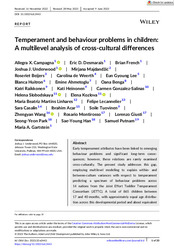Temperament and behaviour problems in children: A multilevel analysis of cross-cultural differences
| dc.contributor.author | Campagna, A. X. | |
| dc.contributor.author | Acar, İbrahim Hakkı | |
| dc.date.accessioned | 2023-11-01T13:03:17Z | |
| dc.date.available | 2023-11-01T13:03:17Z | |
| dc.date.issued | 2023-07-04 | |
| dc.identifier.issn | 1522-7227 | en_US |
| dc.identifier.uri | http://hdl.handle.net/10679/8918 | |
| dc.identifier.uri | https://onlinelibrary.wiley.com/doi/full/10.1002/icd.2443 | |
| dc.description.abstract | Early temperament attributes have been linked to emerging behaviour problems and significant long-term consequences; however, these relations are rarely examined cross-culturally. The present study addresses this gap, employing multilevel modelling to explain within- and between-culture variances with respect to temperament predicting a spectrum of behaviour problems across 14 nations from the Joint Effort Toddler Temperament Consortium (JETTC). A total of 865 children between 17 and 40 months, with approximately equal age distribution across this developmental period and about equivalent representation of genders, were recruited from 14 nations. Greater negative emotionality was associated with more internalizing problems, whereas higher surgency and effortful control predicted fewer internalizing difficulties. Controlling for age and gender, temperament explained significant within- and between-culture variances in internalizing and externalizing problems (at the broad-band and fine-grained levels), as well as sleep problems. For internalizing difficulties, temperament accounted for more between-culture variance. In contrast, for externalizing difficulties, temperament accounted more for how individuals within the same culture differed from their same-culture counterparts. The within-culture findings suggest universal patterns of temperament-problem relations, informing cultural adaptation of interventions; between-culture findings enhance understanding of the implications of the cultural niche for normative behaviour and adjustment. | en_US |
| dc.language.iso | eng | en_US |
| dc.publisher | Wiley | en_US |
| dc.relation.ispartof | Infant and Child Development | |
| dc.rights | openAccess | |
| dc.rights | Attribution-NonCommercial-NoDerivs 4.0 International | |
| dc.rights.uri | https://creativecommons.org/licenses/by-nc-nd/4.0/ | |
| dc.title | Temperament and behaviour problems in children: A multilevel analysis of cross-cultural differences | en_US |
| dc.type | Article | en_US |
| dc.description.version | Publisher version | en_US |
| dc.peerreviewed | yes | en_US |
| dc.publicationstatus | Published | en_US |
| dc.contributor.department | Özyeğin University | |
| dc.contributor.authorID | (ORCID 0000-0003-4007-5691 & YÖK ID 267848) Acar, İbrahim | |
| dc.contributor.ozuauthor | Acar, İbrahim Hakkı | |
| dc.identifier.volume | 32 | |
| dc.identifier.issue | 5 | |
| dc.identifier.wos | WOS:001024174100001 | |
| dc.identifier.doi | 10.1002/icd.2443 | en_US |
| dc.subject.keywords | Behavior problems | en_US |
| dc.subject.keywords | Cross-cultural research | en_US |
| dc.subject.keywords | Early development | en_US |
| dc.subject.keywords | Multilevel modeling | en_US |
| dc.subject.keywords | Temperament | en_US |
| dc.identifier.scopus | SCOPUS:2-s2.0-85164357450 | |
| dc.relation.publicationcategory | Article - International Refereed Journal - Institutional Academic Staff |
Files in this item
This item appears in the following Collection(s)
Share this page




